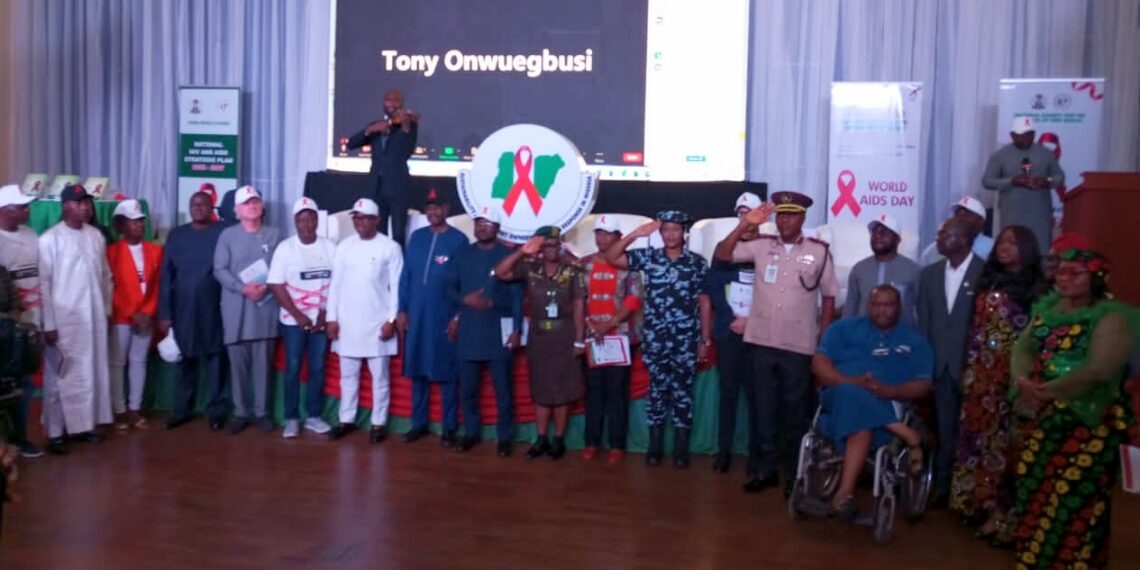The Nigerian government on Friday unveiled two strategic documents aimed at guiding the country’s response in ending HIV/AIDS by 2030.
The documents, National HIV and AIDS Strategic Plan (2023-2027) and the Sustainability Pathway for National HIV Response (2023-2030), in Nigeria, were developed by the National Agency for the Control of AIDS (NACA) with inputs from different local and international partners involved in global HIV response.
Speaking at the unveiling ceremony, the Secretary to the Government of the Federation (SGF), George Akume, said the documents indicate a pivotal commitment towards the global target of epidemic control and ending HIV/AIDS by 2030, and beyond, with states providing leadership.
Mr Akume, who was represented by his Chief of Staff, Chris Taka, urged state governments to study the documents and key into the sustainable HIV response agenda of the Federal Government.
He commended NACA for its commitment and leadership to end AIDS as a public health threat in Nigeria.
He also highlighted the invaluable contributions of communities in the fight against HIV/AIDS.
“It is within these communities that we have found resilience, determination, and the will to make a difference. The strength of these communities has propelled us towards achieving the global goal of ending AIDS by 2030,” he said.
World AIDS DAY
The documents were unveiled as part of activities to commemorate the 2023 World AIDS Day (WAD) themed: “Communities: Leadership To End Aids by 2030”.
WAD is celebrated on 1 December every year to honour the people who have fallen to the disease as well as people living with HIV.
It is also celebrated to raise awareness of the disease and the need for people to know their status.
Strategic documents
In his remark, the Director-General of NACA, Gambo Aliyu, said the National Sustainability Pathway (2023-2030) is aimed at strengthening the HIV response to end AIDS by 2030.
Mr Aliyu said over the last four years and especially during the period of the COVID-19 pandemic, Nigeria has demonstrated tremendous capacity for HIV case identification at the community level.
He noted that Nigeria’s HIV response was the most COVID-19-resilient globally.
Emphasising community-led efforts, Mr Aliyu said with the support of community leaders, Nigeria can end AIDS before 2030 by tackling stigma and discrimination.
“We can end stigma and discrimination, we can ensure no babies in our communities are born with HIV; yes, we can. We did it with Ebola— repeated it with COVID-19, and we can do it with HIV because we are Nigerians,” he said.
Community-led HIV response
During the panel deliberation addressing “Communities Leadership for the Sustainability of HIV Response in Nigeria,” Funmi Adesanya, the Coordinator of the United States President’s Emergency Plan for AIDS Relief (PEPFAR) for the U.S mission, said 70 per cent of the resources designated for Nigeria from other nations are directed towards local organisations.
Ms Adesanya said this strategic allocation aims to enhance the long-term sustainability of Nigeria’s HIV response.
She noted that humanity is what makes up the communities and that when the government allocates resources from taxpayers to enhance the well-being of humanity, “it reflects an acknowledgment of our collective values and a commitment to supporting and elevating national HIV responses.”
“We have recognised that these local organisations get into an emergency phase, and need money to move quickly and so lots of international organisations were funded directly to work in communities. But if we are going to continue to sustain the games, and we will continue to optimise and leverage and be effective and efficient at what we have, we need to redirect those resources,” she said.

Discussing youth engagement in HIV prevention policy, the Project Director of FHI 360 Nigeria, Helen Anyasi, emphasised the need to challenge social norms surrounding prevention.
Ms Anyasi highlighted disparities in condom distribution, particularly for young women.
“For example, when it comes to condom distribution over time, we have studied and found that it is more likely for a young man to receive free condoms than a young woman. Both genders need preventive interventions to protect themselves from HIV and other STIs and prevent unwanted pregnancies,” she said.
Established Sustainable Pathway
In her goodwill message, the mission director, the United States Agency for International Development (USAID), Mellisa Jones, said the sustainability towards ending AIDS can be achievable through partnership between the community and the government.
Ms Jones said the U.S. in its commitment to end AIDS in Nigeria allocated N7.8 billion to Nigerians living with HIV in ensuring that they have access to quality health services.
She noted that over the years Nigeria has made significant progress in combating HIV/AIDS, yet more efforts are needed to reach the goal of eliminating AIDS as a public health threat by 2030.


